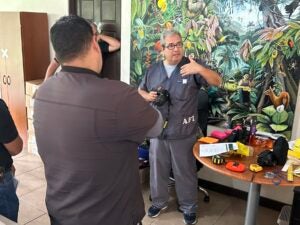
PATNA, India— In a press conference held in Patna, spiritual teacher and author Acharya Prashant joined animal protection organizations Humane Society International/India and People For Animals, to urge devotees to refrain from sacrificing animals during the Gadhimai festival. The animal sacrifice event will take place between December 7th to 9th.
Held every five years in the Bariyarpur district of Nepal, Gadhimai is the world’s largest animal sacrifice event, where thousands of animals—including buffalo, goats, pigs, pigeons and chickens—are beheaded as sacrifice to appease the goddess Gadhimai. A significant proportion of the animals killed at the festival are illegally transported into Nepal from India, with a large percentage coming from the state of Bihar.
Prior to the press conference, representatives of both organizations along with Acharya Prashant met the chief secretary of Bihar to request a directive to police and law enforcement officials ensuring no illegal transport of animals and a statement urging devotees to refrain from animal sacrifice. Additionally, former Member of Parliament Smt. Maneka Sanjay Gandhi, Acharya ji, HSI/India and PFA wrote to the Government of Bihar urging preventive action.
The organizations’ representatives quoted orders of the Hon’ble Supreme Court in Writ Petition (Civil) No. 881/2014 titled Gauri Maulekhi v. Union of India & Ors which acknowledged the smuggling of animals across the Indo-Nepal border and directed authorities to ensure that no live animals are exported out of India into Nepal, except under licence mandated by the Foreign Trade Act 1992.
During the press conference, Acharya Prashant joined the animal welfare groups in encouraging devotees to celebrate the festival with compassion and to honour traditions without harming animals. “Devotion should inspire compassion, not cruelty. Slaughtering animals in the name of the divine diminishes the spirit of worship. Let us honour the Goddess by upholding the sanctity of all life during Gadhimai,” he said.
Smt. Maneka Sanjay Gandhi, chairperson of People For Animals, added: “Protecting animals is not just about preventing suffering, it’s about fostering a society that values compassion and respect for all living beings. We must challenge outdated traditions and create new ways to celebrate festivals that honour life and not take it away.”
To assist in the prevention of illegal border transportation of animals for mass sacrifice, teams from HSI/India and PFA will deploy at strategic border checkpoints to help the border police who will inspect vehicles crossing the border, register cases and confiscate animals.
Alokparna Sengupta, Humane Society International/India’s managing director said: “Just as we did in 2014 and 2019, this year too we stand firmly against the cruelty of animal sacrifice, which is highly regressive and has no place in today’s society. We can honor traditions without the need for animal suffering, creating a better, kinder world for animals and people alike in the future.”
HSI/India and PFA have been working since 2014 to stop animal sacrifice at the site. Following their combined persistent efforts, the gruesome animal sacrifices at Gadhimai have considerably reduced from an estimated more than 500,000 animals killed in 2009 to around 200,000 animals in 2014 and tens of thousands of animals in 2019 including an estimated 3,500 buffaloes.
ENDS
Media contacts:
- HSI/India: Shaili Shah: 6358913485; sshah@hsi.org
- HSI Global: Wendy Higgins: whiggins@hsi.org








